#House Of Lords
Text

Alan West
#suitdaddy#suiteddaddy#suit and tie#men in suits#suited daddy#suited grandpa#suitedman#suit daddy#buisness suit#suitfetish#double breasted#suited men#suitedmen#suited man#british man#british men#member of parliament#house of lords#uk labour party#Alan West
55 notes
·
View notes
Text
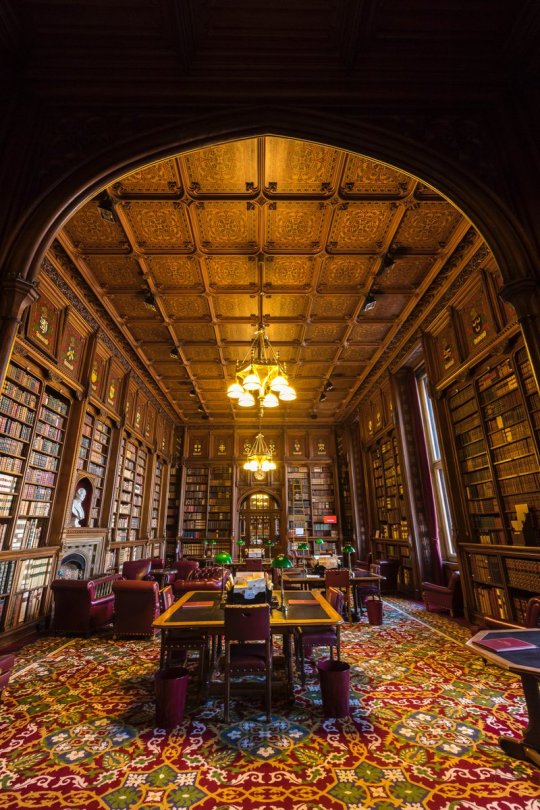
The House of Lords Library l UK Parliament
156 notes
·
View notes
Text
A secretive organisation accused of collaborating with far-right activists has been operating out of the House of Lords for more than a decade, a cache of leaked documents suggests.
The organisation, called the New Issues Group (NIG), includes the former Ukip leader Malcolm Pearson and the Tory former deputy speaker of the House of Lords Baroness Cox.
The cache of documents, acquired by anti-fascist group Hope not Hate, even suggests that a figure who would become one of the UK’s most notorious anti-Muslim activists drafted questions to be asked in the House of Lords by group members.
[...]
Among an array of Conservative party MPs, aristocrats, bishops, businessmen and journalists were high-profile far-right figures including Geert Wilders from the Netherlands, Tommy Robinson and US anti-Islam activist Pamela Geller, who was banned from entering the UK in 2013.
213 notes
·
View notes
Photo

The Palace of Westminster
#London#Westminster#palace#parliament#houses of parliament#house of common#house of lords#history#government#politics#England#UK
135 notes
·
View notes
Text
Guy Fawkes and the Gunpowder Plot

By Ben Johnson
Published 30 October 2020
Remember, Remember, the 5th of November, Gunpowder, Treason and Plot!
Fireworks can be seen all over France every July 14 as the nation celebrates Bastille Day.
Across the USA some ten days earlier on the 4th of July, Americans celebrate their Independence Day.
In Britain, the words of a children’s nursery rhyme “Remember, Remember the 5th of November, Gunpowder, Treason and Plot” are chanted as fireworks fly and bonfires gradually consume a human effigy known as the ‘Guy.’
So who was this Guy? And why is he remembered so fondly 400 years after his death?
It could be said that the story started when the Catholic Pope of the day failed to recognise England’s King Henry VIII‘s novel ideas on separation and divorce.
Henry, annoyed at this, severed ties with Rome and appointed himself head of the Protestant Church of England.
Protestant rule in England was maintained and strengthened through the long and glorious reign of his daughter Queen Elizabeth I.
When Elizabeth died without children in 1603, her cousin James VI of Scotland became King James I of England.
James had not been long on the throne before he started to upset the Catholics within his kingdom.
They appear to have been unimpressed with his failure to implement religious tolerance measures, getting a little more annoyed when he ordered all Catholic priests to leave the country.
A group of Roman Catholic nobles and gentlemen led by Robert Catesby conspired to essentially end Protestant rule with perhaps the biggest ‘bang’ in history.
Their plan was to blow up the King, Queen, church leaders, assorted nobles, and both Houses of Parliament with 36 barrels of gunpowder strategically placed in the cellars beneath the Palace of Westminster.
The plot was apparently revealed when the Catholic Lord Monteagle was sent a message warning him to stay away from Parliament as he would be in danger, the letter being presented to Robert Cecil, James I’s Chief Minister.


Some historians believe that Cecil had known about the plot for some time and had allowed the plot to ‘thicken’ to both ensure that all the conspirators were caught and to promote Catholic hatred throughout the country.
And the Guy? Guy Fawkes was born in Yorkshire on 13 April 1570.
A convert to the Catholic faith, Fawkes had been a soldier who had spent several years fighting in Italy.
It was during this period that he adopted the name Guido (Italian for Guy), perhaps to impress the ladies.
What we do know is that Guido was arrested in the early hours of the morning of November 5th 1605, in a cellar under the House of Lords, next to the 36 kegs of gunpowder, with a box of matches in his pocket and a very guilty expression on his face.
Under torture, Guy Fawkes identified the names of his co-conspirators. Many of these were the relations of a Catholic gentleman, Thomas Percy.
Catesby and three others were killed by soldiers while attempting to escape.
The remaining eight were imprisoned in the Tower of London before being tried and executed for High Treason.
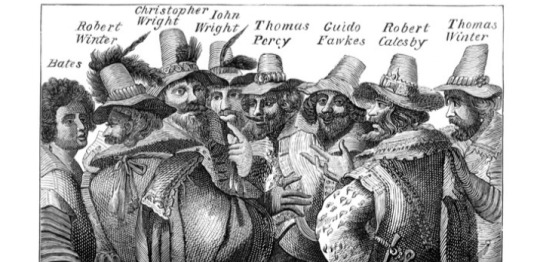
They experienced that quaint English method of execution, first experienced almost 300 years earlier by William ‘Braveheart’ Wallace.
They too were hanged, drawn, and quartered.
*Hanged, drawn and quartered:
Victims were dragged on a wooden hurdle behind a horse to the place of execution where they were first of all hanged, then their genitals were removed.
They were disembowelled and beheaded.
Their bodies were finally quartered, the severed pieces often displayed in public.
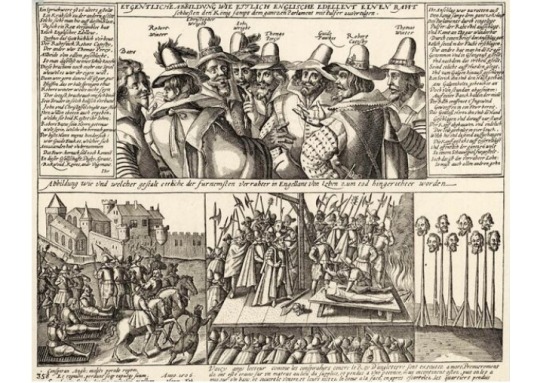
—
Guy Fawkes (13 April 1570 – 31 January 1606), also known as Guido Fawkes while fighting for the Spanish, was a member of a group of provincial English Catholics involved in the failed Gunpowder Plot of 1605.
The Gunpowder Plot of 1605, in earlier centuries often called the Gunpowder Treason Plot or the Jesuit Treason, was an unsuccessful attempted regicide against King James I by a group of English Catholics led by Robert Catesby, who considered their actions attempted tyrannicide and who sought regime change in England after decades of religious persecution.
The plan was to blow up the House of Lords during the State Opening of Parliament on 5 November 1605, as the prelude to a popular revolt in the Midlands during which King James's nine-year-old daughter, Princess Elizabeth, was to be installed as the new head of state.
#Guy Fawkes#Guido Fawkes#Gunpowder Plot of 1605#Gunpowder Treason Plot#Jesuit Treason#King James I#Robert Catesby#5 November 1605#House of Lords#State Opening of Parliament#King Henry VIII#Queen Elizabeth I#King James I of England#Palace of Westminster#Lord Monteagle#Robert Cecil#Thomas Percy#Tower of London#High Treason
47 notes
·
View notes
Text
You Shall Be My Roots
You shall be my roots and
I will be your shade,
though the sun burns my leaves.
You shall quench my thirst and
I will feed you fruit,
though time takes my seed.
And when I'm lost and can tell nothing of this earth you will give me hope.
And my voice you will always hear. And my hand you will always have.
For I will shelter you.
And I will comfort you.
And even when we are nothing left,
not even in death,
I will remember you.
-Mark Z. Danielewski, House Of Leaves, p. 565
@louudthoughts
#house of leaves#poems on tumblr#poem#poets corner#poemsbyme#my art#poetsclub#poets cafe#house of lords#life#poets on tumblr#poetry#spilled thoughts#spilled words#spilled ink#spilled writing#spilled poetry#loud thoughts#@louudthoughts
14 notes
·
View notes
Text

Politics is wild. Like what do you mean that there's a bunch of old people who nobody voted in who can interfere with laws whenever they want and we can't even vote them out?
#this is mostly about house of lords but Americans i understand ur pain#marvels-meme#marvel#mcu#shitpost#marvel memes#carol danvers#kamala khan#monica rambeau#the marvels#wake up new meme template just dropped#politics#house of lords#us senate
23 notes
·
View notes
Text
16 notes
·
View notes
Text

#emma kennedy#political threads#rishi sunak#rwanda migration plan#house of lords#uk general election#uk news#uk politics#conservative party
18 notes
·
View notes
Text

Richard Dannatt
#suitdaddy#suiteddaddy#suit and tie#men in suits#suited daddy#suited grandpa#suitedman#suit daddy#daddy#buisness suit#suitfetish#double breasted#suited men#suitedmen#suited man#british man#british men#member of parliament#house of lords#Richard Dannatt
30 notes
·
View notes
Text
Anonymous asked: I have always wondered why Winston Churchill never received a proper noble title by the time he died. Ex-Prime Ministers such as Harold Macmillan was made an earl and Margaret Thatcher was made a baroness so why wasn’t Churchill recognised for his heroic leadership and political service during the Second World War?
As you might imagine the answer isn’t as straight forward as you might suppose. In truth Sir Winston Churchill was recognised for shepherding the country and the British Empire through the darkest hours of war. His place in history is assured and for someone who always had an eye on the arc of history Churchill, I imagine, died happily enough knowing his achievements were enshrined in the nation’s long history.
Churchill was offered the title of the Duke of Dover as well as Knight of the Garter by George VI, a monarch who at the outset preferred Chamberlain to Churchill but in time came to deeply appreciate Churchill’s qualities as a war leader. Churchill, much to the King’s surprise, declined the offer of a dukedom and also membership of the Order of the Garter, saying that it would be inappropriate given that the electorate had just given him the Order of the Boot - he had just lost the 1945 General Election to Labour’s Clement Attlee.
Later in 1955, after retiring as prime minister, Churchill was again offered elevation to the peerage in the rank of duke by Queen Elizabeth II as the Duke of London (apparently). He again declined. But Churchill did accept in 1953 from Queen Elizabeth II the Order of the Garter. The Queen appointed him the 912th Knight of the Garter on April 24, 1953. He had already been made a Companion of Honour and a member of the Order of Merit. The Order of the Garter is the most senior and the oldest British Order of Chivalry and was founded by Edward III in 1348. The Order, consisting of the King and twenty-five knights, honours those who have held public office, who have contributed in a particular way to national life or who have served the Sovereign personally.
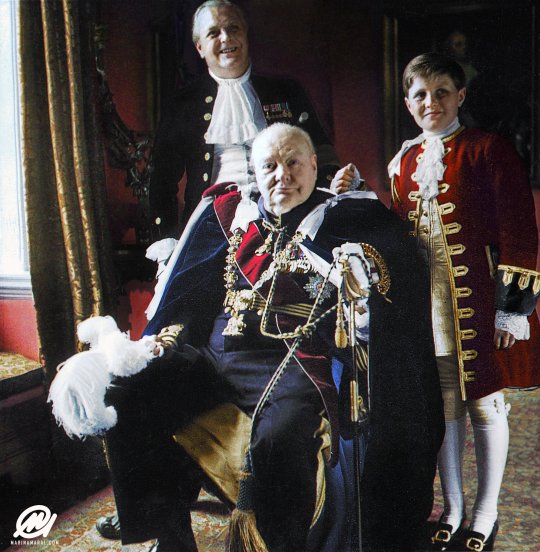
So why did he turn down being a duke because after all past prime ministers retiring from the House of Commons were offered earldoms and other titled baubles?
A few reasons have been put forward by historians and his biographers. It isn’t because Churchill didn’t think it was a special honour, because he recognised its importance. His reasons seemed more practical.
For one thing being offered a dukedom meant also the expectation that you lived the lifestyle of a duke. It goes without saying the lifestyle of a duke, back then, was an expensive undertaking. In the 1940s and 1950s a duke was expected to be rich, to have at least two stately homes plus a large house in London, and to live on his estates and play a part in local affairs. Being a JP, raising funds for local charities, showing up for school openings and the like. It’s all very Downton Abbey-esque. Certainly the social expectations pre-1945 of the British aristocracy well established.
My grandfather was told by his grandfather of how his childhood friend from school, Lord Lansdowne, a great-grandson of Prime Minister Lord Shelburne and a marquess with two stately homes, was offered a dukedom after being viceroy of India; but Henry Petty-Fitzmaurice, the 5th Marquess of Landsdowne, refused because his income was not large enough. In fact being a duke was no fun at all, despite what people then and especially now think.
At the outset of the 1870s, the British aristocracy could rightly consider themselves the most fortunate people on earth: they held the lion's share of land, wealth, and power in the world's greatest empire. By the end of the 1930s they had lost not only a generation of sons in the First World War, but also much of their prosperity, prestige, and political significance. This loss was accentuated in slow motion speed into the 1950s and beyond. Other countries such as Russia, Germany or Austria can pinpoint a single event to the demise of their landed nobility (revolution or war), but in Britain it has been quintessentially different. Britain was unique in that the displacement of the British aristocracy occurred without revolutionary overthrow. It was in fact a bloodless revolution.

The assembled Dukes in 2010: (from left to right) 1. James Graham, 8th Duke of Montrose; 2. David Manners, 11th Duke of Rutland; 3. John Seymour, 19th Duke of Somerset; 4. Ralph Percy, 12th Duke of Northumberland; 5. Andrew Russell, 15th Duke of Bedford; 6. Edward Fizalan-Howard, 18th Duke of Norfolk; 7. Torquhil Campbell, 18th Duke of Argyll; 8. Maurice FitzGerald, 9th Duke of Leinster; 9. Murray Beauclerk, 14th Duke of St Albans; 10. Arthur Wellesey, 8th Duke of Wellington.
The sobering scholarship of the Cambridge historian, Sir David Cannadine has pointed to mainly three principal reasons for the decline of the aristocracy in British public life. Firstly, land reform (especially in Ireland). The unearned income of the landlord became increasingly the target, especially in Ireland, of new political movements. and the huge sales of land in the 1920s to meet taxes and death duties. - crippled the aristocracy in Britain. This was combined with a lengthy agricultural depression that began at roughly the same time. Indeed it began when the price of wheat dropped during the 1880s. The gradual increase of tonnage being shipped because of steam, allowed large quantiles of arable produce to enter Europe from the US and elsewhere, reducing prices. The British refused to slam tariffs on imports, because the new electorate enfranchised in 1885 were townies and liked the lower food prices in the shops.

Secondly, the mass killings in France and Belgium in World War One that claimed a generation of British lives of young men. The aristocracy volunteered for the British armed forces in droves because they were dispirited by their losing social and economic struggle at home, and preferred to fight a battle they thought they could win. In actuality, the aristocratic ethos carried with it many obligations, one of which was that an aristocrat not shirk from fighting his country's battles. The deeply ingrained sense of honour nurtured by the British upper class was one of its most admirable characteristics, and the sons (and sometimes fathers) of the upper class who headed for the front lines simply were acting in accordance with their sense of honour. The result was a casualty rate far in excess of any other social group in the country.
Thirdly, hand in hand with all this was the whirlwinds of social change taking place such as the rise of the middle class into the professions seen as the traditional strongholds of the aristocracy. The professionalisation of traditional occupations such as the civil service, church, military, politics, or law meant the educated middle classes could compete, and frequently excel, an aristocracy now resting on past laurels. The aristocracy couldn’t complain as they just grew fat and lazy whilst the more risk taking and ambitious middle classes had a greater hunger to succeed. More damning was the fact that the aristocracy lost touch with their societal roots of duty and obligation and were rightly found to not represent the populace with the extension of the electoral franchise.
These days dukes have adapted to the winds of change. Some have followed Dukes of Bedford in 1945 and later the infamous Marquess of Bath to open their stately homes, Woburn Abbey and Longleat respectively, as theme parks cum tourist attractions. They were much criticised at the time. Alexander Montagu, 10th Duke of Manchester, sold off his two stately homes in the early 1950s and lost much of his status doing so - in the 1600s, his heir might have been prevented from assuming his title and seat in the Lords because of insufficient wealth. This happened to Roger Stafford, heir of that medieval Stafford family, over whom Henry Montagu, the 1st Duke of Manchester, presided a royal commission to see if poverty disqualified his claim to the barony of Stafford.
As interesting as this discussion is, I find myself straying from the question at hand.

Back to Churchill. I am of the view that the main reason why Churchill turned down a dukedom was that he knew that accepting a peerage might have cut short a renewed career in the Commons for his son Randolph and in due course might also prevent one for his grandson Winston. At the time there was no procedure for disclaiming a title. Indeed the procedure was first established only later by the Peerage Act 1963. As things stood then in Churchill’s time, upon inheriting a peerage, either Randolph or Winston would immediately be unseated from the House of Commons.
In the event, Randolph never sat in Parliament after losing his only seat there in 1945 and indeed was to die only three years after his father, so the dukedom would have had no effect on his career. Randolph's oldest son Winston did serve in the Commons from 1970 until 1997, but by that time provision existed for disclaiming a hereditary peerage, as long-serving far left Labour MP Tony Benn - born Anthony Wedgwood Benn, son of Labour Party peer, Viscount Stansgate - had done in 1963 upon the passing of the Peerage Act.
It also can be argued that Churchill had no need of a dukedom when he was already an aristocrat - or at least born into one. His father was Lord Randolph Churchill and direct descendant, of the famed 1st Duke of Marlborough. Winston was born in 1874 at his family’s ancestral home of Blenheim Palace in Oxfordshire. Whilst Churchill was an aristocrat, he didn’t really have much time for them, nor was he particularly enamoured by that class. Why that was the case, I would be happy to address in a future post. But for it’s enough to say that Sir Winston S. Churchill remained a commoner until he died.

Although it was considered usual for prime ministers to be offered earldoms, recent prime ministers have declined to accept peerages - the last to do so was Margaret Thatcher, who was made a baroness. Interestingly enough, Harold Macmillan was offered an Earldom immediately when he retired but rejected it, in retirement he later made many political interventions and criticised his successors, when Thatcher became Prime Minister he requested a peerage and was given the title Earl of Stockton, he used his new seat in the Lords to criticise Thatcher's handling of the coal miners' strike, so he pretty much used his new peerage as a way to have a platform from which to oppose Thatcher.
But with fewer peerages being created the political climate has changed where it’s rare that an outgoing prime minister is even offered any kind of title, let alone a peerage. These days a lot of that is down the the public image of the outgoing prime minister and it seems a lot of water has to pass under the bridge before someone can be considered for any kind of honour. John Major, Tony Blair, Gordon Brown, David Cameron, Theresa May, and even Boris Johnson (let’s not even talk about Liz Truss) have to wait for the political climate to change any kind of recognition.
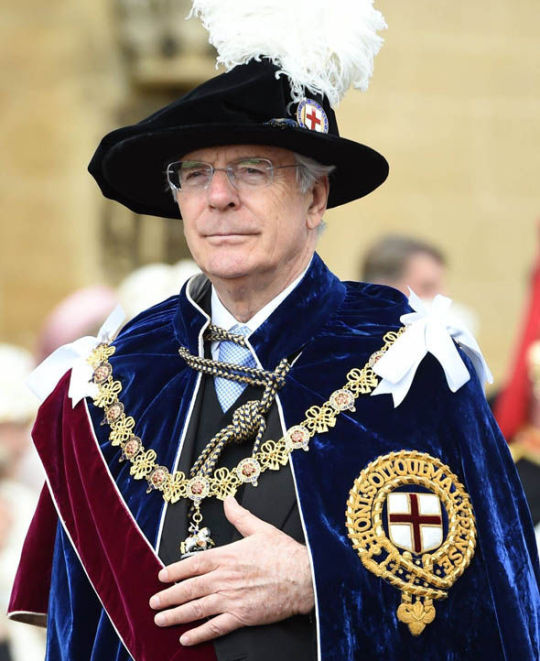
John Major turned down a peerage (or so it was reported) but accepted a knighthood in 2005 from the Queen when he was made Knight Companion of the Most Noble Order of the Garter, the oldest and most senior British order of chivalry. Tony Blair, who left Downing Street more than 15 years ago, recently followed in the footsteps of Major in 2021 when he too was knighted and made a Knight Companion of the Most Noble Order of the Garter.
Appointments to the Garter are in the Queen’s gift and made without prime ministerial advice. They are for life unless a knight or lady companion offends against certain “points of reproach”.

Founded in 1348 by Edward III, the garter is awarded by the sovereign for outstanding public service and achievement. It is said to have been inspired by events at a ball in northern France, attended by the king and Joan, Countess of Salisbury. The countess is believed to have dropped her garter, causing laughter and some embarrassment. The king, however, picked it up and wore it on his own leg, uttering the phrase “Honi soit qui mal y pense” – “Shame on him who thinks this evil” - now the order’s motto. The order’s emblem is a blue ribbon or garter worn by men below the left knee and by women on the left arm. There are now 21 non-royal companions in the order out of a maximum of 24.
Gordon Brown and David Cameron will have to wait their turn. Heaven knows what will happen when Liz Truss’ time comes. Perhaps we can have some piecemeal reform whereby by all means bestow a title on said politician but the public decides on the place name.
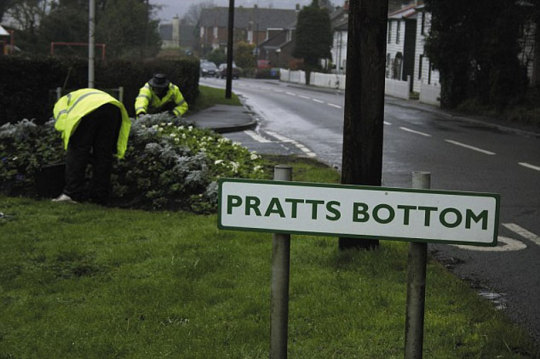

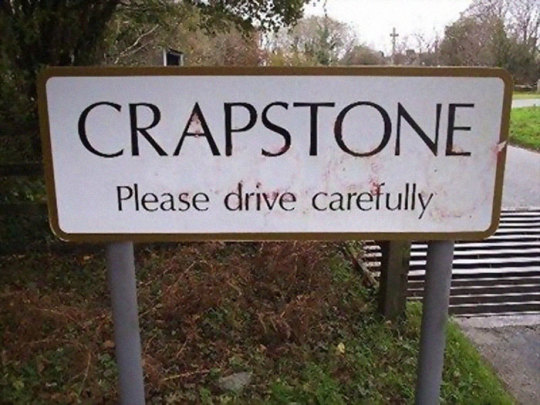

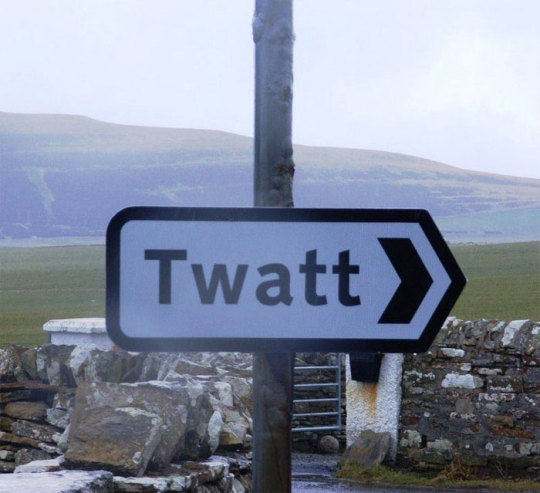
I look forward to hearing more from Lord Cameron of Pratt Bottom, Lord Brown of Great Snoring, Lady May of Crapstone, Lord Johnson of Bonks Hill, and Lady Truss of Twatt on great issues of the day in our public discourse.
Thanks for your question.
#question#ask#peerage#winston churchill#aristocracy#house of commons#knighthood#house of lords#politics#queen#monarchy#order of the garter#nobility#prime minister
56 notes
·
View notes
Text

Gregg Giuffria
3 notes
·
View notes
Text



SPREAD THE WORD!
Animals (Low-Welfare Activities Abroad) Bill pioneered by STAE to end adverts for cruel animal tourism worldwide has its Second Reading in the Lords on Friday, 14 July 2023.
JULY 14 COULD BRING THE WORLD A HUGE STEP CLOSER TO ACHIEVING THIS TOGETHER.
#standwithstae
STAE’s petition to help protect Asian elephants from brutal tourism abuse is the biggest in history for any animal species.
Please sign and share now at this crucial time as our campaign for new law advances in Westminster’s House of Lords. ⬇️
bit.ly/STAEpetition
🤍🐘🤍
#STAE#Animals (Low-Welfare Activities Abroad) Bill#Asian elephants#cruel animal tourism ban#tourism abuse#protect animals#save wildlife#elephants#House of Lords#Save The Asian Elephants
17 notes
·
View notes
Text
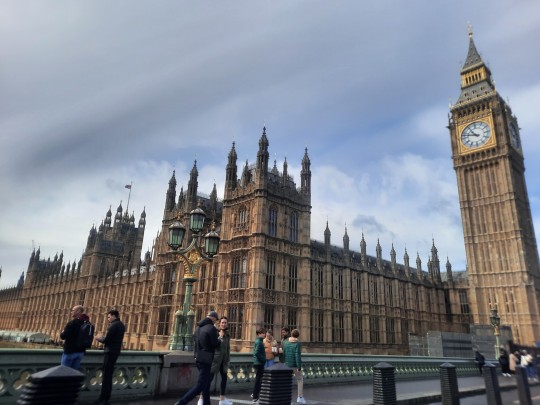
Where all of out bullshittery goes down.
Snapped it from the car as I thought I'd take you all with me today.
3 notes
·
View notes
Text

(Image credit: UK National Portrait Gallery)
On 18th October, 1963, BBC news reported that a Scottish Earl, Lord Home, had won what it described as 'one of the most bitterly fought leadership contests to become Britain’s Prime Minister'.
There were two immediate challenges for the new PM: he had to convince his disgruntled leadership rivals to fall in line and join the Cabinet to create a functioning government – the other minor inconvenience was that Lord Home needed a Commons constituency and fast. Three weeks later, the former 14th Earl of Home was now Sir Alec Douglas-Home, MP for Kinross and West Perthshire.
The change of leadership was as a result of the resignation of Harold Macmillan. GOV.UK rather poetically explains the reason for Macmillan's sudden departure as ‘due to a prostate condition that was exacerbated by the Profumo Affair’.
The BBC reported;
"…Mr Macmillan's choice of a peer to succeed him as Prime Minister - the first to hold the office since 1895 - is highly controversial, and has been greeted with bewilderment by the supporters of Rab Butler, who was widely believed to have been the Prime Minister's favoured candidate…The press and the opposition have also attacked Lord Home's aristocratic background and perceived lack of a public profile…"
The fracas surrounding the leadership transition, a result of the vague process loosely described in the Conservative Party as ‘informally emerging’, led to party reforms; In 1965, Edward Heath would be the first Tory leader to be elected by ballot.
The Douglas-Home administration lasted just under one year. Labour under Harold Wilson won the 1964 election with a precarious majority of four, but would consolidate its position in 1966.
Sir Alec served as Foreign Secretary during Edward Heath’s single term in government (1970-74). He subsequently went back to the House of Lords by virtue of a Life Peerage, as Lord Home of the Hirsel, where he served until his death in 1995.
#uk government#uk politics#social history#democracy#british culture#british prime ministers#uk history#house of lords#house of commons#uk general elections
38 notes
·
View notes
Link
A private health tycoon claimed £18,000 of expenses for attending the House of Lords in a year despite not speaking or casting a single vote, openDemocracy can reveal.
Khalid Hameed was appointed as a crossbench peer in 2007 but has rarely contributed, making just ten speeches in his entire parliamentary career.
That hasn’t stopped the 82-year-old from charging taxpayers tens of thousands of pounds simply for turning up.
Records show that he claimed £18,088 in tax-free “attendance allowance” in the 12 months until April 2022, despite having no record to show for his work.
24 notes
·
View notes